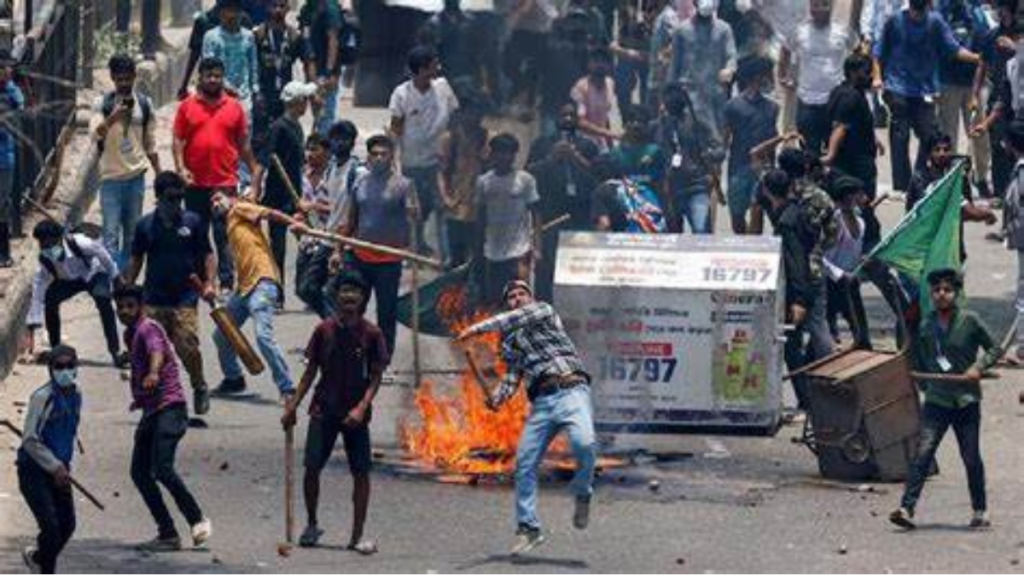After Sheikh Hasina fled the country, the US called for democratic elections as soon as possible, celebrations

Coordinators of the Bangladesh student protest movement meet Army Chief General Waqar-uz-Zaman after the military announced that it would form an interim government after Sheikh Hasina’s resignation as prime minister.
On Monday, Hasina resigned and fled to Bangladesh, where a crackdown on demonstrations that began with student protests against preferential job quotas killed hundreds and sparked a movement demanding her ouster. Hasina’s resignation was celebrated on Monday.
The army said in a statement that Zaman planned to meet protest organizers on Tuesday afternoon local time (06:00 GMT), the day after Zaman announced Hasina’s resignation in a televised address and said a caretaker government would be formed.
Zaman said Hasina held talks with leaders of major political parties except the long-ruling Awami League to discuss the way forward and held talks with President Mohammad Shahabuddin.
Shahabuddin said in a televised speech late on Monday that the caretaker government would hold elections as soon as possible after consulting all parties and stakeholders.
Opposition Bangladesh Nationalist Party (BNP) chairperson and Hasina’s nemesis Begum Khaleda Zia was “unanimously decided” to be hospitalized in a graft case in 2018, but after a year for her health. Distraught by this, she denied the allegations against her.
Zia, 78, “has been legally cleared of all charges and will soon be released,” a BNP spokesman said on Monday.
Earlier on Tuesday morning, the United States praised the conduct of the Bangladesh Army. The United States has long called for value for independent rights in Bangladesh, and we want the temporary government to be democratic and inclusive. We appreciate the restraint shown by the military today, a White House spokesman said.
US Senate Majority Leader Chuck Schumer said the interim government should aim to hold early democratic elections. Hasina’s violent response to sensible protests has not constant her continued rule.
Hasina won the election for the fourth time in a row in January, which was boycotted by the opposition. The US State Department said the January election was not free and fair, with reports of voting irregularities and violence in Washington concerned.
Recent protests and crackdowns have led to some of the worst violence since Bangladesh was founded five decades ago. During a briefing at the army headquarters, Zaman promised an inquiry into the deaths.
directors of the student protests on Tuesday called for the creation of a new temporary government with Nobel Peace Prize laureate Muhammad Yunus as chief mentor, according to a video posted on Facebook.

“No government other than the one we suggested will be accepted,” Nahid Islam, one of the main coordinators of the student movement, said in a video with three other organizers. “We will not accept an army-backed or army-led government.”
Also Read: Upcoming Stock Bonuses in August 2024
Yunus and three others were sentenced to six months in prison in January for violating labor laws at Grameen Telecom, a nonprofit he founded in 1983. Yunus told the Guardian in June that he was under 20 years old. Pressure from the Bangladeshi government for his work has been credited with improving the lives of millions of poor people, especially women. Reuters reported that Yunus did not immediately respond to a request for comment.
Elsewhere, the World Bank said it was assessing the impact of events in Bangladesh on its lending program but was committed to supporting the “developmental aspirations of the people of Bangladesh”.
In June, the World Bank board approved two projects totaling $900 million to strengthen Bangladesh’s economic sector policies and improve urban infrastructure.
The World Bank was one of the first development partners to support Bangladesh after independence and has since committed about $41 billion in grants and interest-free credits.


